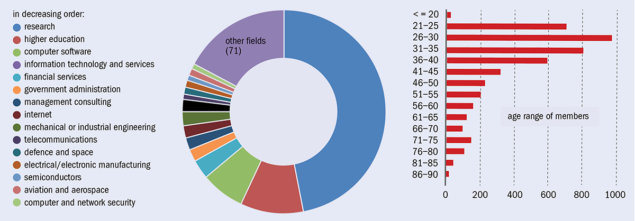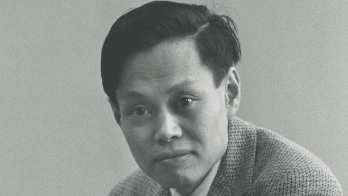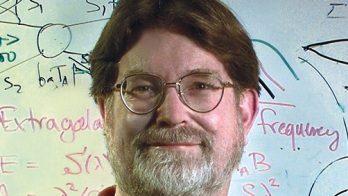Two years since it was established, the CERN Alumni Network is proving a valuable careers resource, especially for young physicists who move out of academia, write Laure Esteveny and Rachel Bray.

CERN has 65 years of history and more than 13,000 international users. The CERN Alumni Network, launched in June 2017 as a strategic objective of the CERN management, now has around 4600 members spanning all parts of the world. Alumni pursue careers across many fields, including industry, economics, information technology, medicine and finance. Several have gone on to launch successful start-ups, some of them directly applying CERN-inspired technologies.
So far, around 350 job opportunities, posted by alumni or companies aware of the skills and profiles developed at CERN, have been published on the alumni.cern platform. Approximately 25% of the jobs posted are for software developer/engineer positions, 16% for data science and 15% for IT engineering positions. Several members have already been successful in finding employment through the network.
Another objective of the alumni programme is to help early-career physicists make the transition from academia to industry if they choose to do so. Three highly successful “Moving out of academia” events have been held at CERN with the themes finance, big data and industrial engineering. Each involved inviting a panel of alumni working in a specific field to give candid and pragmatic advice, and was very well attended by soon-to-be CERN alumni, with more than 100 people at each event. In January the alumni network took part in an academia/industry event titled “Beyond the Lab – Astronomy and Particle Physics in Business” at the newly inaugurated Higgs Innovation Centre at the University of Edinburgh.
The data challenge
The network is still in its early days but has the potential to expand much further. Improving the number of alumni who have provided data (currently 37%) is an important aim for the coming years. Knowing where our alumni are located and their current professional activity allows us to reach out to them with relevant information, proposals or requests. Recently, to help demonstrate the impact of experience gained at CERN, we launched a campaign to invite those who have already signed up to update their profiles concerning their professional and educational experience. Increasing alumni interactions, engagement and empowerment is one of the most challenging objectives at this stage, as we are competing with many other communities and with mobile apps such as Facebook, WhatsApp and LinkedIn.
One very effective means for empowering local alumni communities are regional groups. At their own initiative, members have created seven of them (in Texas, New York, London, Eindhoven, Swiss Romandie, Boston and Athens) and two more are in the pipeline (Vienna and Zurich). Their main activities are to hold events ranging from a simple drink to getting to know each other at more formal events, for example as speakers in STEM-related fields.
One of the most rewarding aspects of running the network has been getting to know alumni and hearing their varied stories. “It’s great that CERN values the network of physicists past and present who’ve passed through or been based at the lab. The network has already led to some very useful contacts for me,” writes former summer student Matin Durrani, now editor of Physics World magazine. “Best wishes from Guyancourt (first office) as well as from Valenciennes (second office) and of course Stręgoborzyce (my family home). Let’s grow and grow and show where we are after our experience with CERN,” writes former technical student Wojciech Jasonek, now a mechanical engineering consultant.
After two years of existence we can say that the network is firmly taking root and that the CERN Office of Alumni Relations has seen engagement and interactions between alumni growing. Anyone who has been (or still is) a user, associate, fellow, staff or student at CERN, is eligible to join the network via alumni.cern.







